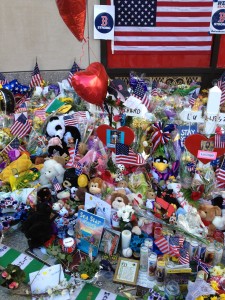Prepared for today’s edition of Tikkun Daily.
Two days after the Boston Marathon bombings, Massachusetts Governor Deval Patrick was asked in a public radio interview if there would be a permanent memorial to the victims of that horrific act. Patrick understandably felt it was too early to speculate about such a memorial—this was before the dramatic lockdown of Boston and surrounding communities. He went further to say that the most fitting tribute would be to return next year with the biggest and best marathon ever.
That surely would be a testimony to the city’s spirit, but it seems the governor, as a good technocrat, was missing the point. Fact is, people were already finding makeshift ways to memorialize the event. And if past atrocities are a guide, they’ll eventually find a permanent space for that solemn purpose.
If I didn’t know this already, I’d have found out just by standing for a few minutes near Copley Square this past Monday morning, at the intersection of Boylston and Berkeley streets.
Boylston, a crime scene, was still closed at the time. But people stood silently on a sidewalk at the corner, leaning against a police barricade in front of a popup memorial. They gazed at the flowers, flags, candles, handwritten notes, and other items left by anonymous people. They stared at three white crosses in the center of that growing memorial—in remembrance of the three who perished in the twin bombings of April 15. The shrine to eight-year-old Martin Richard was teeming with Teddy Bears, balloons, and children’s books.
People will memorialize, because they know hallowed ground when they see it. It’s extraordinary, when you think about it—how the heinous and the hallowed can share the same space, how a site of evil can be transfigured as holy. But this seems to happen every time. It happened at the Twin Towers, at the Murrah Federal Building at Oklahoma City, at Pearl Harbor, and most profoundly, at Auschwitz. Each of those names marks out a distinct space in the timeless realm of evil. And each space is inviolable.
But how about Boylston Street, or a consecrated corner of it? Is it now part of this geography of the sacred? It is, if you think of such space the way historian Edward Linenthal does. In an interview adapted in a book I did some years ago with Bob Abernethy of PBS’s Religion & Ethics Newsweekly, he said:
My definition of a sacred space is a simple one. Any place that’s capable of being defiled is by definition sacred. You can’t defile ordinary space. Any place that for a group of people is so special that a certain way of being there would be an act of disrespect means that that place is charged with a particular kind of meaning.
Linenthal, who now teaches religious studies at Indiana University, continued:
I tell my students, if they were sitting in the parking lot at K-Mart with a boom box, no one’s going to really care. They might be irritated that the noise is too loud. But if they had a boom box at Gettysburg or in the grove of trees at Shanksville [into which United Airlines Flight 93 crashed on September 11, 2001, in Pennsylvania] or in a church, a mosque, or a temple, it would be considered an act of defilement.
This is why questions about what to do with these places fraught with meaning can be so vexing and contentious. Consider the 9/11 memorial in Manhattan. The decision to store the unidentified remains of victims in an underground repository—rather than a more visible place of tribute—stirred resistance from victims’ families.
Sure enough, a debate erupted this past week over the impromptu memorial at Boylston Street—how to preserve it, where to move it. Such a discussion would have been ludicrous, if this were ordinary space. If it were incapable of being defiled.
And that’s just a prelude. A few days ago, Boston Mayor Tom Menino’s office let it be known that the process of figuring out how to permanently memorialize the bloodshed at Boylston has begun. …read more







